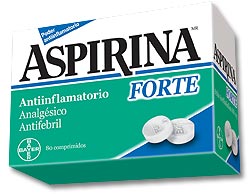Bayer's "ASPIRINA" Merely Descriptive of Analgesics, Says TTAB
Finding Bayer's mark ASPIRINA to be merely a slight variation or a misspelling of the generic term "aspirin," the Board affirmed a Section 2(e)(1) refusal to register on the ground that the mark is merely descriptive of analgesics. In re Bayer Aktiengesellschaft, Serial No. 78212751 (December 1, 2005) [not citable].

The Examining Attorney contended that the term "aspirina" is the Spanish word for "aspirin" and therefore is merely descriptive of analgesics. Relying on online dictionaries, NEXIS articles, a GOOGLE search report, and an English translation of Bayer's Spanish website, she asserted that ASPIRINA "is the foreign equivalent of ordinary English wording."
Bayer asserted that it owns registrations for ASPIRINA in many countries, that ASPIRINA is a coined term having no specific meaning in any language, and that the term is used only as a trademark for its goods. Bayer acknowledged that U.S. consumers "not familiar with the international fame" of its mark may believe that ASPIRINA is suggestive of the term "aspirin," but because of the differences in spelling, pronunciation, and meaning, consumers will not view the mark ASPIRINA as merely descriptive.
Bayer submitted a Spanish/English dictionary definition of ASPIRINA that conflicted with those of the PTO, and it pointed out that the PTO's NEXIS excerpts were themselves "conflicting" as to whether ASPIRINA is a trademark.
The Board first observed that "aspirin" was long ago determined to be generic for an analgesic -- by Judge Learned Hand in Bayer Co. v. United Drug Co., 272 F. 505 (S.D.N.Y. 1921) -- and it took judicial notice of the Webster's dictionary definition of "aspirin" as "a white crystalline compound ... of salicyclic acid used esp. in tablet form as an antipyretic and analgesic." The question, then, was "whether a slight variation, ASPIRINA, is merely descriptive for analgesics"?

In view of the "closeness in sound, appearance and meaning" between ASPIRINA and "aspirin," the Board saw no need to "engage in the type of foreign equivalent analysis urged by the examining attorney," and it likewise brushed aside the Spanish/English translations and the purported renown of ASPIRINA in foreign countries. Instead it concluded that:
"prospective consumers in this country, aware of the generic term 'aspirin,' will view ASPIRINA as a slight variation (or even a misspelling) of the generic term and, thus, the term is merely descriptive of analgesics. The term immediately conveys the impression that applicant's analgesics are aspirin-based products."
In short, the Board ruled that "the mere addition of the letter 'A' at the end of the generic term 'aspirin' is simply insufficient to transform ASPIRINA into an inherently distinctive mark for analgesics."
The Board also refused to entertain Applicant Bayer's request (untimely made at oral argument) that the case be remanded to the PTO so that Bayer could seek registration on the Supplemental Register.
TTABlog comment: In light of the evidence of record, the Board took a rather strange shortcut to its conclusion. What is the Board's evidentiary basis for saying how "prospective consumers" will perceive the term ASPIRINA, when the NEXIS and dictionary evidence was inconclusive? Should the benefit of the doubt have gone to the Applicant?
Text Copyright John L. Welch 2005.




0 Comments:
Post a Comment
<< Home